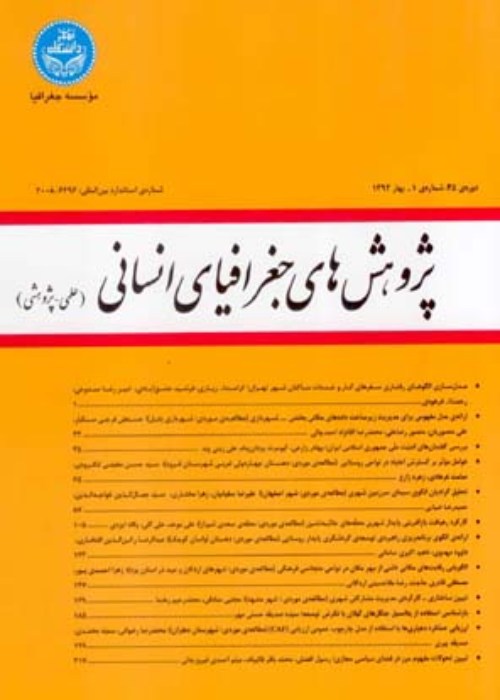An Inquiry about the problem of Law in Geography
Author(s):
Article Type:
Research/Original Article (دارای رتبه معتبر)
Abstract:
Introduction
Discovering theories and laws explaining the patterns and behaviors of natural and human world is the goal of science. In social science realm, there here been two antagonist and different approaches about lawability of this sciences. Some schools based on realistic approach have insisted on assimilating the natural and human sciences on the contrary idealistic school considering humanism, considers social science different from natural science and denies the similarity between the lawability of and social natural sciences. This issue in geography is also from those disputable issues that has already been the subject of many disputations among different geographical schools. Some of them points out the geography as a lawable science such as environmentalism, behaviorism, spatial and systematic. In opposition, possibilism, exceptionalism and radical schools (critical and post-modern) considers the geography as a lawless knowledge. this paper proceeds the issue differently that whether the geography is a lawable science or not? If it is, then how are its laws? According to the analysis of the paper, geography is considered as a lawable science.
Methodology
This paper is a fundamental research by the typology and by the purpose is problem resolving (mental and philosophical problem). The analysis of paper is based on logical and epistemological theorems and reasoning’s. The sources used in the paper are documentary and library based.
Result and discussion:
Scientific law is a kind of generalization with comprehensive reliability and truth. In other words, this kind of law is unbounded universal at time and space including three characteristics such as universal, conditional prediction and experimental falsification. In this field, some of the positivistic geographers following the nature were seeking lawful order and dominating on society and livelihood. In their opinion geography is an objective, observational, quantitative and lawable knowledge. Therefore, its laws and rules can be exploited by the deduction. In this regard, observation without theory has upper priority and geometrical models are most significant. Geography according to this perspective is considered as science seeking for discovering universal rules and principles dominating over environmental elements such as social and natural. The duty of geographer is discovering causative relation between phenomena and representing them based on geographical general and comprehensive laws. In contrast, some geographers doubtfully look at causative and necessary relationships in geography and they have reacted against such attitude. They believe in lawless geography emphasizing on human will and liberty and natural, cultural, historical and ideological differences. These groups among geographical spaces have searched for understanding the meaning of human society. The present paper as regards geography in general and political geography in particular are Credit science, and their studied phenomena and concepts such as state, territory, border, political management of space, government, nation, administrative division, spatial management, political organization of space … and are considered as “rational Credit” and propositions and rational Credit in geography have experimental and testable essence just like natural or physical sciences. Also because in credit science, propositions and laws, it is not necessary to have various truths or be universal, rather, even if the subject of proposition or law is personal it can be considered as a law, as to the point of this paper criterion of being scientific for Credit laws isn’t variety of truths or objective samples, but causal relation between subject and object is its criterion. Therefore, according to the paper geography can be considered as a lawable science.
Conclusion
Science is an effort to discover existing order in various phenomena. In other words, the goal of science is discovering theories and rules explaining patterns and behaviors of natural and social world. According to this definition any kinds of science fields and branches studies the order of a part of the world. For example, physics studies existing order in movement of energy and material. Medicine explains and analyses the order of body. Hence, Geography attempts to recognize the existing order in phenomena layout on place and dominated process on patterns (spatial behaviors). Totally, any scientific category is composed of real, objective and tangible subjects that has some characteristics like observationally, experimentality and falsificationality. It is also based on analogical and inductive method or logic or in precisely word, categories are based on compositional mechanism of induction and syllogism. A brief deliberation on theme, structure, subject and methodology in geography will indicate that all the features and characteristics of a scientific knowledge can be found in geography. Therefore, scientific explanation in geography is just like other “lawable sciences”. Of course there is no consensus among geographers about the lawability in geography. As law is a generalized science with comprehensive credit and truth or in other words, unbounded universal are in space and time and the fewest necessary condition for lawability of a scientific phrase is to have a universal generalization. Therefore some geographers due to particularity and specification of places, un-repeatability of human phenomena and role and interference of human wills, values and motivations believe in geography as a lawless science. But since geography is a Credit science, not real, its lawability isn’t necessarily based on plurality and frequency proofs (just like in natural sciences), rather lawability in geography is based on causal relation between subject and object or dependent and independent variables particularly in human and social sciences. Therefore, unlike naturalist geographers point of view, even if a geographical proposition is also personal but there is a causal relation between subject and object, then the personal proposition will be a general rule and law and it can be generalized to all other spaces and places. Therefore according to the analysis of this paper, geography in general and other geography sub-fields like political geography in particular, are considered as lawable sciences.Keywords:
Language:
Persian
Published:
Human Geography Research Quarterly, Volume:50 Issue: 105, 2018
Pages:
749 to 771
magiran.com/p1913560
دانلود و مطالعه متن این مقاله با یکی از روشهای زیر امکان پذیر است:
اشتراک شخصی
با عضویت و پرداخت آنلاین حق اشتراک یکساله به مبلغ 1,390,000ريال میتوانید 70 عنوان مطلب دانلود کنید!
اشتراک سازمانی
به کتابخانه دانشگاه یا محل کار خود پیشنهاد کنید تا اشتراک سازمانی این پایگاه را برای دسترسی نامحدود همه کاربران به متن مطالب تهیه نمایند!
توجه!
- حق عضویت دریافتی صرف حمایت از نشریات عضو و نگهداری، تکمیل و توسعه مگیران میشود.
- پرداخت حق اشتراک و دانلود مقالات اجازه بازنشر آن در سایر رسانههای چاپی و دیجیتال را به کاربر نمیدهد.
In order to view content subscription is required
Personal subscription
Subscribe magiran.com for 70 € euros via PayPal and download 70 articles during a year.
Organization subscription
Please contact us to subscribe your university or library for unlimited access!



